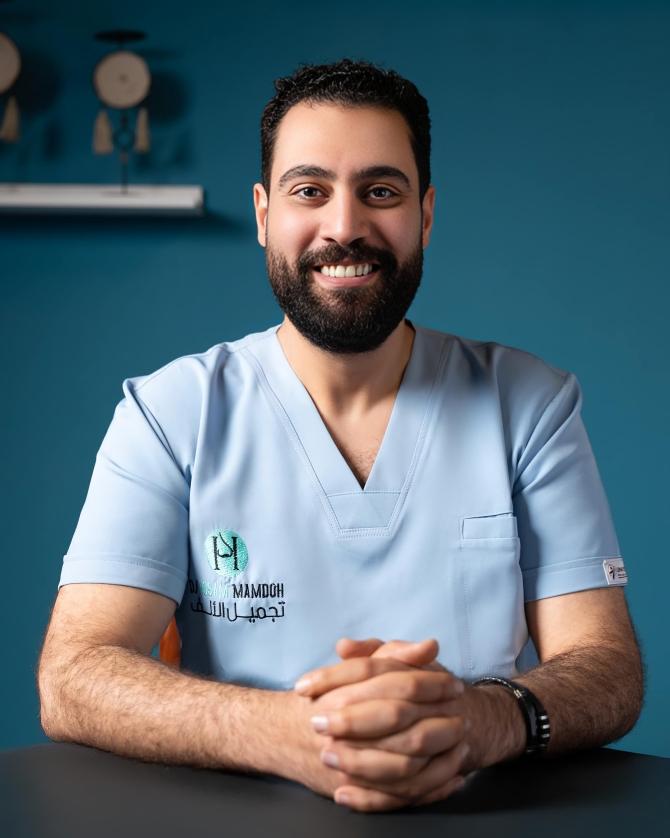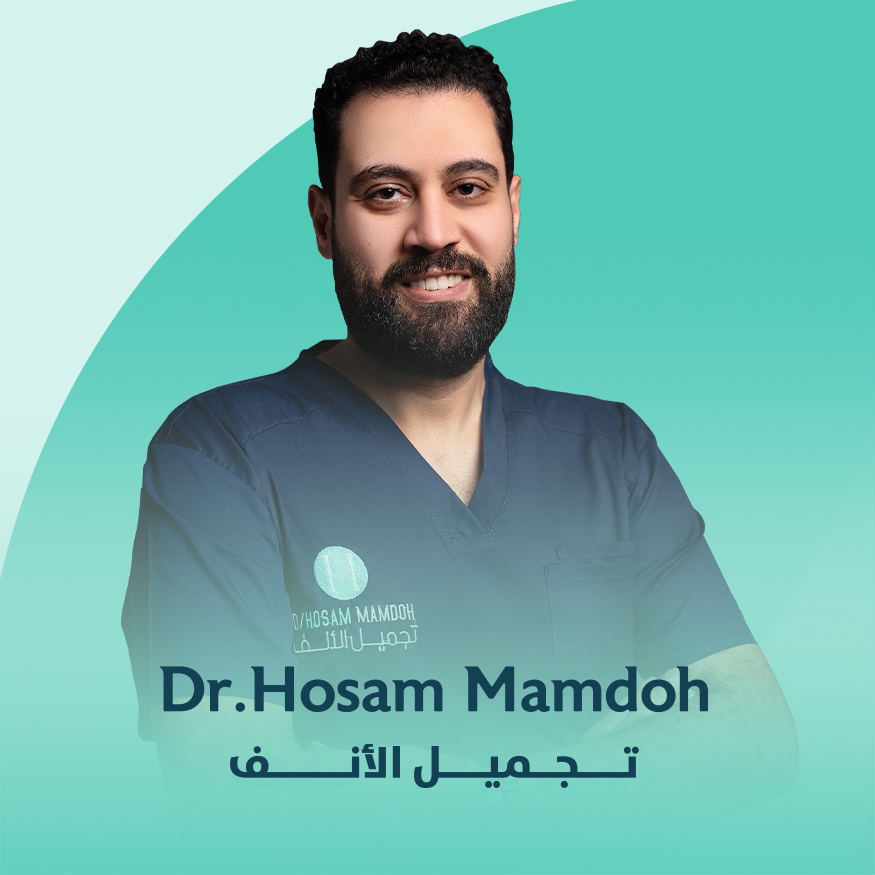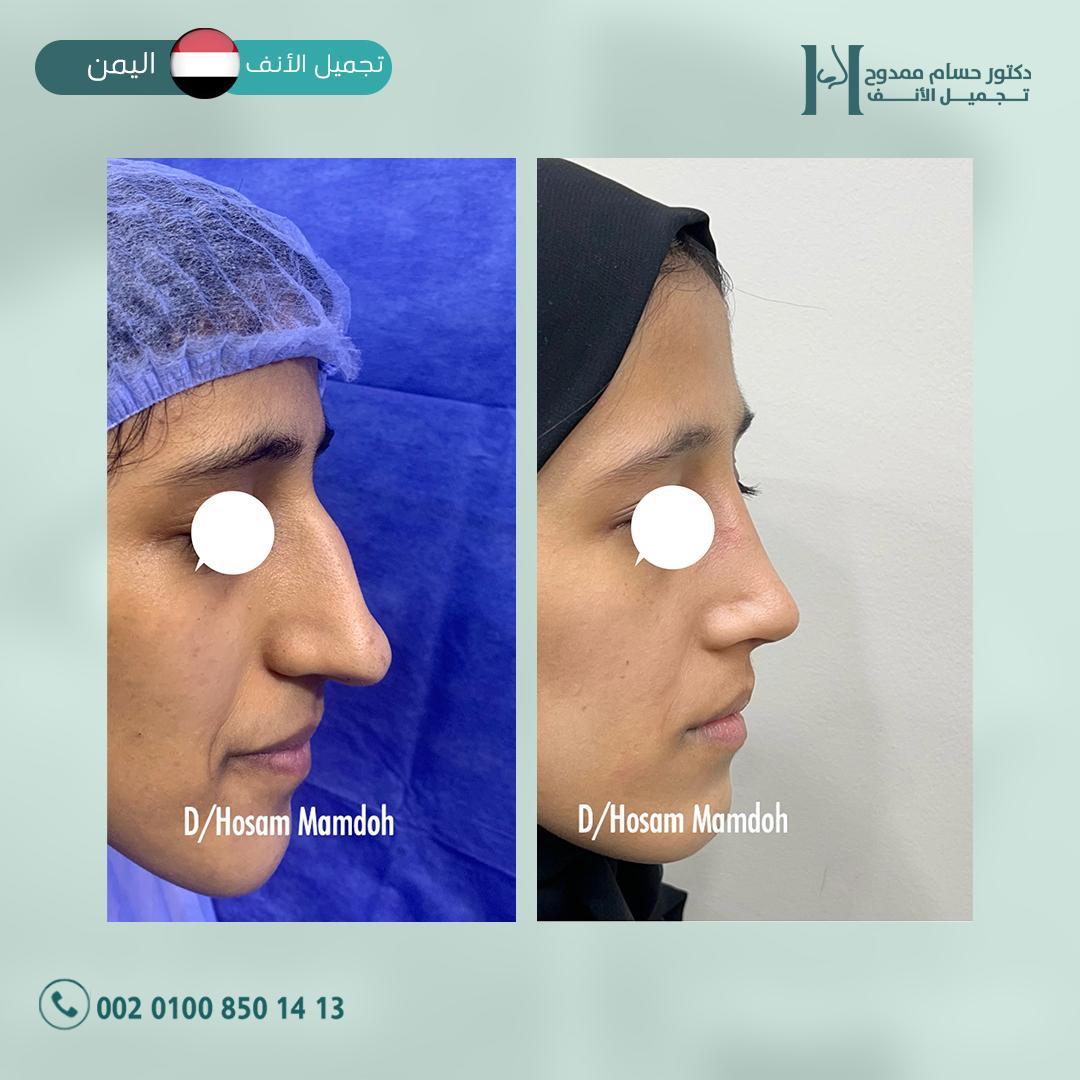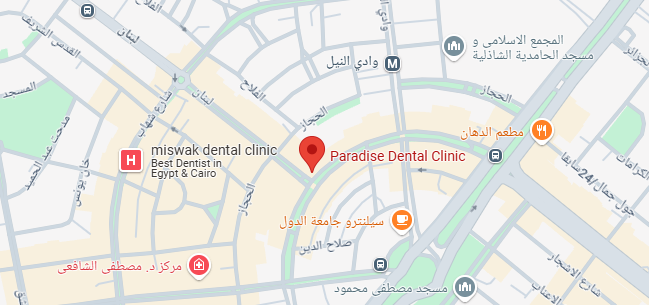- Medical History and Clinical Examination: The doctor starts by reviewing the patient's symptoms and inquiring about their medical history.
- Nasal or Laryngeal Endoscopy: A small endoscope is used to closely examine the nose or throat to diagnose infections or tumors.
- Hearing Tests: For example, audiometry testing is used to determine the level of hearing loss.
- Laboratory Tests: Samples of nasal or throat secretions may be taken for laboratory analysis.
- CT Scans or MRI: These are used to examine the sinuses or inner ear in complex cases.
Dr. Hossam Mamdouh – Rhinoplasty & ENT Consultant
Dr. Hossam Mamdouh
Dr. Hossam Mamdouh is one of the most prominent names in the field of rhinoplasty and ENT (Ear, Nose, and Throat) surgeries in Egypt and the Arab world. With over 10 years of experience, he has successfully performed thousands of surgeries for patients from various Arab countries, gaining deep expertise in dealing with different nose shapes, congenital deformities, skin types, and ethnicities.

- Name: Dr. Hossam Mamdouh
- Website: drhosammamdoh.com/
- Phone: 01008501413
- City: Giza
- Area: Dokki
⭐ Dr. Hossam Mamdouh – Rhinoplasty & ENT Consultant 🧑⚕️
👨⚕️ About the Doctor
Dr. Hossam Mamdouh is one of the most prominent names in the field of rhinoplasty and ENT (Ear, Nose, and Throat) surgeries in Egypt and the Arab world. With over 10 years of experience, he has successfully performed thousands of surgeries for patients from various Arab countries, gaining deep expertise in dealing with different nose shapes, congenital deformities, skin types, and ethnicities.
He holds prestigious medical and academic positions and is a pioneer in functional and aesthetic rhinoplasty, using the latest global techniques to ensure safe, natural-looking results.
🎓 International Memberships & Scientific Positions
-
Member of the European Academy of Beauty
-
Member of the American Academy of Advanced Nasal & Skull Base Surgery
-
Head of the Rhinoplasty Unit at Arab Health Aesthetic Centers
🩺 Medical Services Provided by Dr. Hossam Mamdouh
🔹 Rhinoplasty
Surgical procedures to enhance the nose's shape in harmony with facial features, while preserving breathing function.
🔹 Functional Rhinoplasty
Correcting internal issues like deviated septum to improve breathing along with aesthetic refinement.
🔹 Thick-Skinned (Fleshy) Nose Rhinoplasty
Special techniques tailored for noses with thick skin to achieve clear and natural results.
🔹 Pain-Free Rhinoplasty Without Nasal Packing
Advanced technique that minimizes post-operative pain and speeds up recovery — no internal packing required.
🔹 Laser Rhinoplasty
Utilizing laser technology to increase precision and reduce recovery time.
🔹 Nose Fillers (Non-Surgical Rhinoplasty)
Non-surgical solutions to correct mild deformities and enhance nasal contour using dermal fillers.
🔹 Crooked Nose Correction
Treating nasal deviation caused by congenital issues or previous trauma.
🔹 Nasal Tip Reduction
Refining the size of the nose to better match facial proportions.
🔹 Nose Sculpting
Enhancing the fine details and smoothness of the nose structure for a more elegant look.
🔹 Septoplasty (Deviated Septum Correction)
Improving breathing by surgically correcting the nasal septum.
🔹 Turbinate Reduction Surgery
Reducing enlarged nasal turbinates that obstruct airflow and cause breathing difficulties.
🔹 Endoscopic Sinus Surgery
Treating chronic sinusitis using endoscopes without external incisions.
💎 Why Choose Dr. Hossam Mamdouh for Rhinoplasty?
-
🥇 Winner of the Best Arab Rhinoplasty Surgeon Award – 2020
-
Dedicated solely to rhinoplasty surgeries, providing focused expertise and accurate results
-
Performed hundreds of surgeries for international patients from across the Arab region and Europe
-
First to introduce pain-free rhinoplasty in Egypt in 2016
-
Uses international techniques introduced for the first time in the Middle East
-
Supported by a fully equipped medical team for pre- and post-op care
-
Combines aesthetic and functional vision to deliver optimal outcomes
🏥 Clinic Locations
📍 Cairo – Mohandessin
🗺️ Address: 30 Geziret El Arab St. corner with Lebanon St. – 2nd Floor
📞 Phone: +201008501413
📍 Mansoura
🗺️ Address: El Tor’a Street – in front of National Bank – Al-Haramain Tower – 8th Floor
📞 Phone: +201008501413


Services
Nose Aesthetic with Fillers
Nose Jeweler
Nose Reduction
Nose Sculpting
Correction of Nasal Septum Deviation
Reducing Nasal Cartilage (Nasal Turbinates)
Endoscopic Sinus Surgery
Cleft Lip Repair
Nose Aesthetics
Nose Reduction
Nose Sculpting
Nasal Tip Lift
Fleshy Nose
Nose Aesthetics
Laser Nose Aesthetics
Laser Nose Aesthetics
Nose Aesthetic with Fillers
Correcting Nose Deviation
Hooked Nose
Tags
Nose plastic surgeon in Egypt
Nose plastic surgeon in Mohandessin
Nose plastic surgeon in Mansoura
Best nose plastic surgeon in Mohandiseen
Nose plastic surgeon in Dokki
Best nose plastic surgeon in Egypt
Cost of Rhinoplasty in Egypt
Non-surgical nose plastic surgery
Rhinoplasty in Cairo
Nose reduction surgery
Nose plastic surgeon in Egypt
Nose reduction surgeon in Egypt
Nose shaping with the best techniques in Egypt
Wide nose plastic surgery
Latest techniques in nose plastic surgery
Best nose plastic surgeon in Cairo
Nose plastic surgeon in Alexandria
Nose plastic surgery in Egypt
Non-surgical nose size reduction
Nose plastic surgery with laser
Nose surgery for breathing
Cost of nose plastic surgery in Alexandria
Correction of nasal septum deviation in Egypt
Nose plastic surgery in Riyadh
Nose plastic surgery in Dubai
Nose plastic surgeons in the Arab world
Best nose reduction surgery in Egypt
Nose bridge lifting surgery
Wide nose plastic surgery in Egypt
Nose plastic surgery in Sudan
Book with a nose plastic surgeon in Egypt
Functional nose plastic surgery
Cosmetic nose plastic surgery
Pain-free nose plastic surgery
Nose Reshaping Specialist
Nose Job Before and After
Nose Surgery
Cost of nose plastic surgery
Non-surgical nose plastic surgery
Best nose plastic surgeon in the Arab world
Before and after pictures of nose plastic surgery
FAQ
Skin diseases are a group of conditions that affect the health of the skin. Some common skin diseases include:
-
Acne: This usually occurs during adolescence but can persist into adulthood. It happens when pores are blocked by oils or dead skin cells, leading to pimples, blackheads, and pustules.
- Acne Treatment: Treatment depends on the severity of the condition. It includes topical treatments such as benzoyl peroxide or salicylic acid creams. In severe cases, oral medications like isotretinoin or antibiotics may be used.
-
Eczema: A chronic skin condition that causes dryness, redness, and intense itching. It can appear on any part of the skin.
- Eczema Treatment: It involves using moisturizing creams, topical corticosteroids to reduce inflammation, and avoiding triggers that cause irritation.
-
Psoriasis: A chronic autoimmune condition that causes rapid skin cell growth, leading to the appearance of red, scaly patches.
- Psoriasis Treatment: Topical medications such as corticosteroids can be used, as well as light therapy (laser treatment) or oral medications to reduce inflammation.
-
Sexually Transmitted Infections (STIs): These include genital herpes, gonorrhea, and chlamydia. These infections are transmitted through sexual contact and can cause painful symptoms in the genital area.
- STI Treatment: It includes antiviral medications (such as acyclovir for herpes) or antibiotics for gonorrhea and chlamydia.
-
Topical Treatment: Topical creams or medications containing active ingredients like benzoyl peroxide, salicylic acid, or retinoids are commonly used. These treatments help reduce inflammation, clean the pores, and decrease oil production.
-
Oral Treatment: For more severe cases, doctors may prescribe antibiotics such as doxycycline or tetracycline. In other cases, isotretinoin may be prescribed. Isotretinoin is a powerful medication used to treat severe acne.
-
Laser Treatment: Various types of lasers can be used to treat persistent acne. For example:
- Pulsed Dye Laser: This laser reduces acne-causing bacteria and minimizes skin inflammation.
- Blue Light Laser: This laser is used to kill acne-causing bacteria within the pores.
Sexually transmitted infections (STIs) are diseases transmitted through sexual contact, and include:
-
Genital Herpes: Caused by the herpes simplex virus (HSV), genital herpes leads to painful sores in the genital area.
- Treatment: There is no cure for herpes, but symptoms can be managed with antiviral medications such as acyclovir.
-
Gonorrhea and Chlamydia: These are bacterial infections that can affect the genital area, throat, or rectum.
- Treatment: They are treated with antibiotics such as azithromycin or doxycycline.
-
Genital Warts: Caused by the human papillomavirus (HPV).
- Prevention: The HPV vaccine is the best prevention method. Genital warts can also be treated with topical medications or cryotherapy (freezing).
Prevention:
- Condom Use: Using condoms during sexual activity is one of the best ways to prevent STIs.
- Regular Screening: Regular STI screenings and following personal hygiene instructions can help with prevention and early treatment.
Causes:
- Sun Exposure (UV Radiation): Exposure to UV rays leads to increased melanin production, resulting in dark spots.
- Aging: The appearance of age spots (also known as liver spots).
- Hormonal Changes: Hormonal fluctuations, such as during pregnancy, can lead to melasma.
- Skin Inflammation: Conditions like acne can leave behind pigmentation marks after healing.
Treatment:
- Whitening Products: Such as hydroquinone or kojic acid.
- Laser Treatment: Including intense pulsed light (IPL) or Q-Switch lasers.
- Mesotherapy: Injections of whitening and nourishing substances to the skin.
Causes:
- Hormonal Changes: Such as pregnancy, menopause, or Polycystic Ovary Syndrome (PCOS).
- Genetics: A family history of hair loss can increase the likelihood.
- Stress: It can lead to temporary hair shedding.
- Vitamin Deficiencies: A lack of iron or Vitamin D can contribute to hair loss.
Treatment:
- Minoxidil: A topical treatment used to stimulate hair growth.
- Hormonal Medications: Such as birth control pills or anti-androgens to treat PCOS.
- Mesotherapy: Injections of vitamins and nutrients directly into the scalp.
- Hair Transplant: Transplanting hair follicles from thicker areas to thinning areas on the scalp.
Causes:
- Inflammations: Such as acne, cuts, or burns.
- Surgery: Or deep skin injuries.
- Dermatitis: Which causes the formation of scar tissue.
Treatment:
- Laser Treatment: Such as erbium laser or fractional laser to stimulate skin cell regeneration and reduce scars.
- Topical Creams: Such as silicone or corticosteroid creams.
- Mesotherapy: Injections of nourishing substances and enzymes to improve the appearance of scars.
- Chemical Peeling: To exfoliate the upper layers of the skin and stimulate its renewal.
Causes:
- Sun Exposure: UV rays cause skin damage and accelerate the appearance of wrinkles.
- Smoking: Leads to the breakdown of collagen in the skin.
- Aging: As we age, collagen production decreases, leading to the development of wrinkles.
Treatment:
- Dermal Fillers: Such as hyaluronic acid to fill fine lines.
- Botox Injections: To reduce wrinkles caused by muscle movements.
- Laser Treatment: Fractional laser to stimulate collagen production and rejuvenate the skin.
- Mesotherapy: Injections of vitamins to improve skin elasticity and reduce wrinkles.
Causes:
- Fat Accumulation: Leads to the appearance of cellulite when fat presses against the connective tissue.
- Poor Circulation: Contributes to increased fat accumulation under the skin.
Treatment:
- Mesotherapy: Involves injecting substances that help break down fat and strengthen the tissue, such as caffeine, choline, and silicon.
- Exercise: Helps stimulate circulation and reduce fat.
- Laser Treatment: Cellulaze laser helps break down fat and strengthen connective tissue.
- Sunburn: Caused by excessive exposure to sunlight.
- Contact Dermatitis: Due to reactions with chemicals or plants.
- Acne: May worsen due to increased oil production caused by heat.
Treatment:
- Prevention: Regular use of sunscreen.
- Topical Treatment: Such as corticosteroid creams to reduce inflammation.
- Cold Showers: To soothe sunburn.
Causes:
- Sperm Problems: Such as low sperm count or poor motility.
- Hormonal Imbalances: Such as low testosterone levels.
- Blockages: Blockages can occur in the ducts that transport sperm.
Treatment:
- Hormonal Medications: To stimulate the testes and improve sperm production.
- Surgery: To remove blockages or correct abnormalities.
- Artificial Insemination (IUI) or In Vitro Fertilization (IVF).
An otolaryngologist is a medical professional specialized in diagnosing and treating a wide range of health issues that affect the nose, ears, throat, and mouth. This specialty deals with various conditions such as ear infections, hearing disorders, breathing problems, hoarseness, snoring, swallowing disorders, and tumors of the nose or throat. Treatment may involve non-surgical methods such as medication and physical therapy, or surgical procedures in some cases.
Subspecialties: This specialty includes ear surgery, nasal surgery (such as septoplasty or sinus surgery), laryngeal surgery, and tumor treatment.
- Ear Infections: Such as middle ear infections that can cause pain or hearing problems.
- Sinusitis: A common issue causing nasal congestion, headaches, and difficulty breathing.
- Hearing Disorders: Such as hearing loss caused by ear infections or changes in the inner ear.
- Hoarseness: This can result from inflammation of the vocal cords or problems in the larynx.
- Nasal Congestion: Caused by inflammation or a deviated septum.
- Nasal and Throat Tumors: Both benign and malignant tumors that require accurate diagnosis and surgical treatment.
- Snoring and Sleep Apnea: These conditions are treated by otolaryngologists using breathing support devices or laryngeal surgery.
- Diagnosis and Treatment: The doctor can diagnose hearing loss using hearing tests.
- Medications: If there is an infection or inflammation in the ear, the doctor may recommend medications such as antibiotics.
- Hearing Aids: In cases of chronic hearing loss, the doctor may suggest using hearing aids or, in advanced cases, cochlear implants.
- Surgery: In some cases, surgery may be required to treat problems in the middle or inner ear, such as repairing a ruptured eardrum.
Laryngeal surgery is used to treat various conditions such as benign or cancerous tumors in the larynx or to repair vocal cord abnormalities. The surgery includes:
- Tumor removal: Removing benign or cancerous tumors in the larynx or vocal cords.
- Laryngeal dilation surgery: Expanding the airways in cases of laryngeal stenosis.
- Vocal cord repair: Treating issues affecting the voice, such as vocal cord paralysis.
Medications: Treatment for sinusitis includes antibiotics if the infection is bacterial, and decongestants to relieve nasal congestion.
Surgical treatment: In cases of chronic or refractory sinusitis, surgery may be required to address blockages or to drain the sinuses.
Natural treatments: Nasal irrigation with saline (nasal rinse) is often recommended to help alleviate congestion and improve sinus drainage.
Behavioral treatment: Such as changing sleep positions to avoid sleeping on the back and weight loss.
Surgery: May be necessary in severe cases where excess tissue is removed or the nasal septum is repaired.
Therapeutic devices: A CPAP device is used to provide a continuous airflow to prevent sleep apnea and snoring.
- Voice rest: Reducing voice use helps alleviate swelling and inflammation of the vocal cords.
- Voice therapy: Techniques to improve voice quality through vocal cord training and reducing strain.
- Medications: Medications to reduce inflammation, such as steroids, or antacids in cases of throat irritation.
- Surgery: In cases of tumors or abnormalities in the vocal cords.
Dentists
Cosmetic Doctors
Ophthalmologists
Orthopedic Doctors
Pediatricians
Neuro and spine surgery
Internal doctors
Cardiologists
Ear, nose and throat doctors
Nephrologists and urologists
Psychiatrists
Gynecologists and obstetricians
Plastic surgery doctors
Endocrinologists
Physiotherapists
Dermatologists
Gastroenterologists and Hepatologists
Hematologists and Hemato-Oncologists
Chest and respiratory doctors
Speech, voice and swallowing doctors
Gastric sleeve and gastric bypass doctors
Pancreatic surgeons
Psychiatrists who treat addiction
Doctors for chronic wounds, bed sores and diabetic foot
Nutritionists and weight loss doctors
General surgeons
Doctorate of Geriatrics
Diabetologists and endocrinologists
Allergists and immunologists
Pain medicine doctor
Pediatric Surgeons

